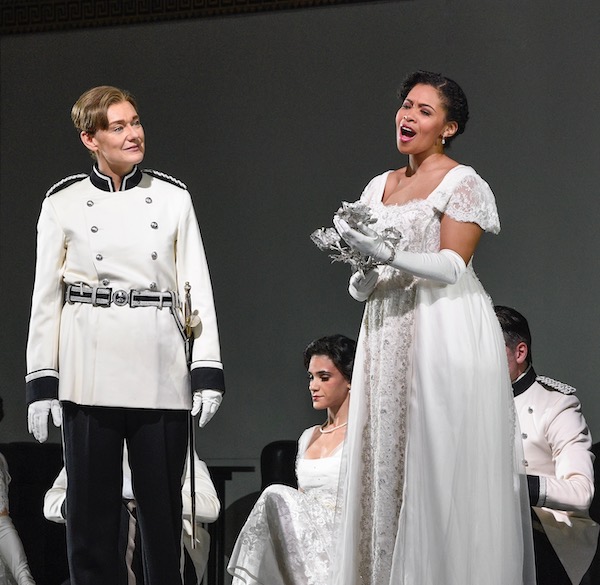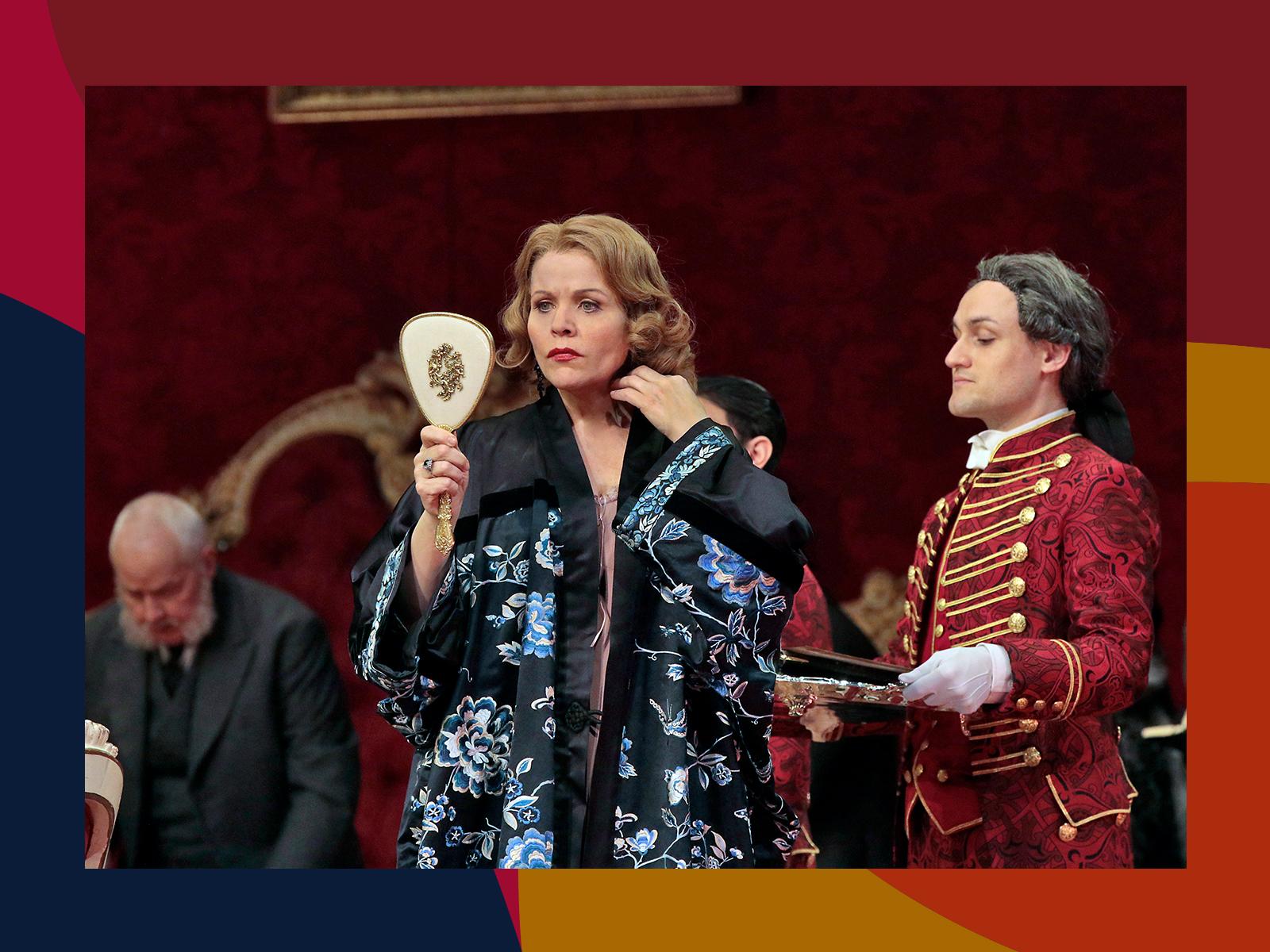This past Monday, saw the Metropolitan Opera's revival of the Robert Carsen production of Der Rosenkavalier, with Camilla Nylund, Magdalena Kozena, and Golda Schultz as the lady leads, and Günther Groissböck reprising his brilliantly scumbaggy Baron Ochs (the character is a scumbag, of course, not GG himself in the slightest), with Mr. Kozena conducting the proceedings. I'd seen this production in HD several years back, with all different leads except GG, and Sebastian Weigle in the pit. Carsen's updating to the early 20th century and the sets actually made more sense in the house, and the dimensions of the settings were a lot more comprehensible in 3 dimensions in the house rather than 2 dimensions in the cinema. It may also have simply reflected seeing this production "again", though live rather than in a cinema, and recalling details of the staging from the memory banks now in 3 dimensions. This was also only my 2nd live Rosenkavalier ever, after a gap of almost 20 years.
It was nice to see SSR in the orchestra pit before the performance, chatting with several players and going over parts of the score. SSR got a rapturous reception when he walked to the pit (including one overly self-consciously hearty 'BRAVO!!!!!' from a member of the audience). In fact, SSR got a rapturous audience reception at the start of each Act. He cued the orchestra to stand before both Acts II and III. At the end of a very long evening, the full orchestra stayed in the pit for their first curtain call from SSR during the applause, as opposed to hurrying out of the pit right away. (It was around 11:30 by then.) What struck me about SSR's treatment of the score was that he fined down the orchestra's sound so as not to cover the singers, and gave the orchestral sound very much the feel of a chamber orchestra. This made for more effective contrast when he did let the orchestra loose during the choral passages in Act III when Ochs gets his comeuppance, or earlier when Ochs' men are being their toxic masculine selves in Act II with the female staff at Faninal's villa.
The ladies did generally well, granted that none of them are native German speakers. The principal male singers, GG and Markus Eiche as Faninal, had much the greater linguistic advantages by comparison, since both of them are native German speakers, of course.
In keeping with fhg's sharp evaluation of Ochs, the New York Classical Review review of this production (a different night than the one I attended, to state the obvious) commented on GG's Ochs:
His one line about not minding the sight of the blood of others, but losing it at the sight of his own, takes on new subtext of how fundamentally a bullying coward Ochs is, when Ochs is now part of a military regiment in this production. In the context of US politics and the moral and intellectual vacuum that is the current Republican Party (not to mention its leader), the phrase "chicken hawk" comes to mind.
One other nice musical detail from this production was that somehow, Carsen managed to stage the very ends of Acts I and III where (except for one git who clapped once too early near the end of Act I) you could actually hear the close from the orchestra of each act, without the audience starting to applaud over the orchestra. In the old Met production, the curtain would begin to drop as the music was playing at the end of Act I, which was a visual cue for audiences to applaud, regardless of whether the orchestra had stopped. Here, in Carsen's production, CN as the Marschallin walked towards the back of the stage, through the various doors of her palace, w/o any curtain drop. Except for the one git, the audience got it, and was smart enough to wait before applauding. If I ever get to hear Der Rosenkavalier live again, I probably will not ever hear the end of Act I w/o early audience applause again.
My guess is that SSR and the production used the version with the tiny stage cuts, as opposed to the full text (e.g. on Solti's and Haitink's recordings), but I'm not 100% sure. If that had been so, it was still a full evening, about 4.5 hours worth. Not everyone in the house made it to the end (and it was not a full house to start with), and several folks did bail after Act II. (I saw a mother and daughter go, and asked them in jest: "Don't you want to stay to see Ochs lose?") The work is arguably too long for its fundamental plot. But now that I am 20 years older, I can understand why Hofmannsthal and Strauss took their time, to mediate on the passage of time. Definitely an evening worth its duration at the opera house.
PS: For fun, the "Aria Code" blog from WNYC has a podcast on Der Rosenkavalier, whose title wins points for its several layers of pop-culture in-jokery:
"Here's To You, Mrs. Marschallin"
It was nice to see SSR in the orchestra pit before the performance, chatting with several players and going over parts of the score. SSR got a rapturous reception when he walked to the pit (including one overly self-consciously hearty 'BRAVO!!!!!' from a member of the audience). In fact, SSR got a rapturous audience reception at the start of each Act. He cued the orchestra to stand before both Acts II and III. At the end of a very long evening, the full orchestra stayed in the pit for their first curtain call from SSR during the applause, as opposed to hurrying out of the pit right away. (It was around 11:30 by then.) What struck me about SSR's treatment of the score was that he fined down the orchestra's sound so as not to cover the singers, and gave the orchestral sound very much the feel of a chamber orchestra. This made for more effective contrast when he did let the orchestra loose during the choral passages in Act III when Ochs gets his comeuppance, or earlier when Ochs' men are being their toxic masculine selves in Act II with the female staff at Faninal's villa.
The ladies did generally well, granted that none of them are native German speakers. The principal male singers, GG and Markus Eiche as Faninal, had much the greater linguistic advantages by comparison, since both of them are native German speakers, of course.
In keeping with fhg's sharp evaluation of Ochs, the New York Classical Review review of this production (a different night than the one I attended, to state the obvious) commented on GG's Ochs:
"Stealing the show was Austrian bass Günther Groissböck, reprising his revelatory interpretation of Baron Ochs. No tubby old lech, this Ochs is a muscular bully, inspiring the loyalty of his men with brutish charisma. Groissböck strikes a perfect balance in his portrayal, conveying enough oafishness to keep the role’s comedic side alive while also feeling utterly repulsive, his casual viciousness coming across as uncomfortably real."
His one line about not minding the sight of the blood of others, but losing it at the sight of his own, takes on new subtext of how fundamentally a bullying coward Ochs is, when Ochs is now part of a military regiment in this production. In the context of US politics and the moral and intellectual vacuum that is the current Republican Party (not to mention its leader), the phrase "chicken hawk" comes to mind.
One other nice musical detail from this production was that somehow, Carsen managed to stage the very ends of Acts I and III where (except for one git who clapped once too early near the end of Act I) you could actually hear the close from the orchestra of each act, without the audience starting to applaud over the orchestra. In the old Met production, the curtain would begin to drop as the music was playing at the end of Act I, which was a visual cue for audiences to applaud, regardless of whether the orchestra had stopped. Here, in Carsen's production, CN as the Marschallin walked towards the back of the stage, through the various doors of her palace, w/o any curtain drop. Except for the one git, the audience got it, and was smart enough to wait before applauding. If I ever get to hear Der Rosenkavalier live again, I probably will not ever hear the end of Act I w/o early audience applause again.
My guess is that SSR and the production used the version with the tiny stage cuts, as opposed to the full text (e.g. on Solti's and Haitink's recordings), but I'm not 100% sure. If that had been so, it was still a full evening, about 4.5 hours worth. Not everyone in the house made it to the end (and it was not a full house to start with), and several folks did bail after Act II. (I saw a mother and daughter go, and asked them in jest: "Don't you want to stay to see Ochs lose?") The work is arguably too long for its fundamental plot. But now that I am 20 years older, I can understand why Hofmannsthal and Strauss took their time, to mediate on the passage of time. Definitely an evening worth its duration at the opera house.
PS: For fun, the "Aria Code" blog from WNYC has a podcast on Der Rosenkavalier, whose title wins points for its several layers of pop-culture in-jokery:
"Here's To You, Mrs. Marschallin"


 - a great Ochs in Aage Haugland, Robert Tear as Valzacchi, and a fabulous turn from WNO's own Dennis O'Neill as the Italian Tenor. Other DVDs are available I'm sure but you can't go too far wrong with this one. Might even watch it again this weekend
- a great Ochs in Aage Haugland, Robert Tear as Valzacchi, and a fabulous turn from WNO's own Dennis O'Neill as the Italian Tenor. Other DVDs are available I'm sure but you can't go too far wrong with this one. Might even watch it again this weekend 

Comment